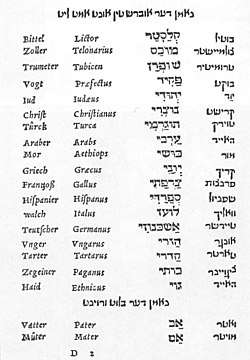Goy
In modern Hebrew and Yiddish goy (/ɡɔɪ/, Hebrew: גוי, regular plural goyim /ˈɡɔɪ.ɪm/, גוים or גויים) is the standard term for a gentile (non-Jew).[1] Through Yiddish,[2] the word has been adopted into English (principally American English) with the same spelling and pronunciation (though often pluralised as goys) also to mean gentile, sometimes with a pejorative sense.[3][4][5]
| Part of a series on |
| Judaism |
|---|
   |
|
|
|
|
|
Other religions |
|
Related topics |
|

In biblical Hebrew goy is the standard term for a nation.[6] The word nation has been the common translation of the Hebrew goy or Greek ethnos in the Septuagint, from the earliest English language bibles such as the 1611 King James Version[7] and the 1530 Tyndale Bible,[8] following the Latin Vulgate which used both gentile (and cognates) and nationes. The term nation did not have the same political connotations it entails today.[9][10]
Long before Roman times it had also acquired the meaning of someone who is not Jewish.[11] As the Jews considered all of the non-Jewish nations in biblical times as polytheistic and idolatrous, goy acquired the meaning "heathen".
Hebrew Bible
The word goy means "nation" in Biblical Hebrew. In the Torah, goy and its variants appear over 550 times in reference to both the Israelites and the gentile nations. The first recorded usage of goyim occurs in Genesis 10:5 and applies innocuously to non-Israelite nations. The first mention of goy in relation to the Israelites comes in Genesis 12:2, when God promises Abraham that his descendants will form a goy gadol ("great nation"). In Exodus 19:6, the Israelites are referred to as a goy kadosh, a "holy nation".[12] While the books of the Hebrew Bible often use goy to describe the Israelites, the later Jewish writings tend to apply the term to other nations.
Some Bible translations leave the word goyim untranslated and treat it as the proper name of a country. In Genesis 14:1, it states that the "King of Goyim" was Tidal. Bible commentaries suggest that the term may refer to Gutium. In all other cases in the Bible, goyim is the plural of goy and means "nations".[6]
One of the more poetic descriptions of the chosen people in the Hebrew Bible, and popular among Jewish scholars, as the highest description of themselves: when God proclaims in the holy writ, goy ehad b'aretz, or "a unique nation upon the earth!" (2 Samuel 7:23 and 1 Chronicles 17:21).
Rabbinic Judaism
The rabbinic literature conceives of the nations (goyim) of the world as numbering seventy, each with a distinct language and purpose.
Chaim ibn Attar[13] maintains that this is the symbolism behind the Menorah:
The seven candles of the Menorah [in the Holy Temple] correspond to the world's nations, which number seventy. Each [candle] alludes to ten [nations]. This alludes to the fact that they all shine opposite the western [candle], which corresponds to the Jewish people.
Maimonides defines plain goy in his Mishneh Torah as a worshipper of idolatry, as he explains, "Whenever we say plainly 'goy', we mean a worshipper of idolatry".[14]
References
- "מילון מורפיקס | גוי באנגלית | פירוש גוי בעברית". www.morfix.co.il. Retrieved 2020-08-15.
- Wolfthal, Diane (2004). "III - Representing Jewish Ritual and Identity" (Google Books). Picturing Yiddish: gender, identity, and memory in the illustrated Yiddish books of Renaissance Italy. Brill Publishers. p. 59 footnote 60. ISBN 978-90-04-13905-3. Retrieved January 13, 2012.
The word goy means literally "nation," but has come to mean "Gentile," seldomly with a derogatory connotation.
- Random House Unabridged Dictionary, Second Edition
- "goy noun - Definition, pictures, pronunciation and usage notes | Oxford Advanced American Dictionary at OxfordLearnersDictionaries.com". www.oxfordlearnersdictionaries.com. Retrieved 2020-08-15.
- "Definition of GOY". www.merriam-webster.com. Retrieved 2020-08-15.
- James Orr, ed. (1939) [1915]. "Goiim". International Standard Bible Encyclopedia. 2. Grand Rapids: William B. Eerdmans Publishing Company. OCLC 819295. Retrieved January 13, 2012.
- KJV Gen 10
- Tyndale Gen 10
- Wiseman, D. J. "Genesis 10: Some Archaeological Considerations." Journal of the Transactions of the Victoria Institute (1955).
- Guido Zernatto & Alfonso G. Mistretta (July 1944). "Nation: The History of a Word". The Review of Politics. 6 (3): 351–366. doi:10.1017/s0034670500021331. JSTOR 1404386.
- The Cambridge history of Judaism, Volume 2, Cambridge University Press, 1989, p. 193. ISBN 978-0-521-24377-3
- Or N. Rose; Margie Klein; Jo Ellen Green Kaiser; David Ellenson (2009). Righteous Indignation: A Jewish Call for Justice. Jewish Lights Publishing. p. 4. ISBN 978-1-58023-414-6. Retrieved 18 November 2010.
- On Numbers 8:2
- Hilchot Ma'achalot Assurot 11:8
External links
